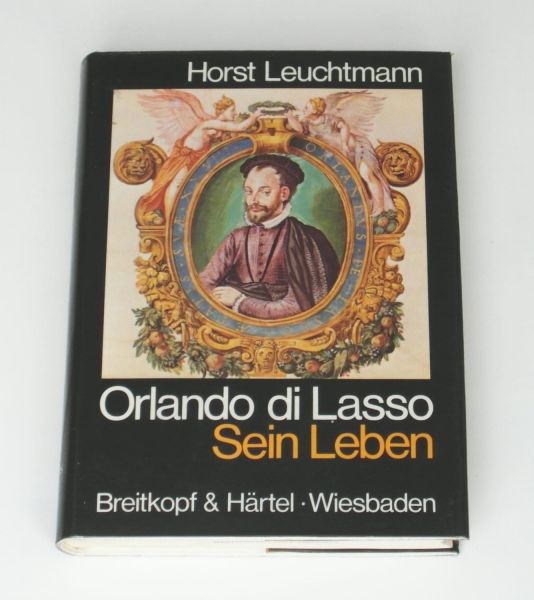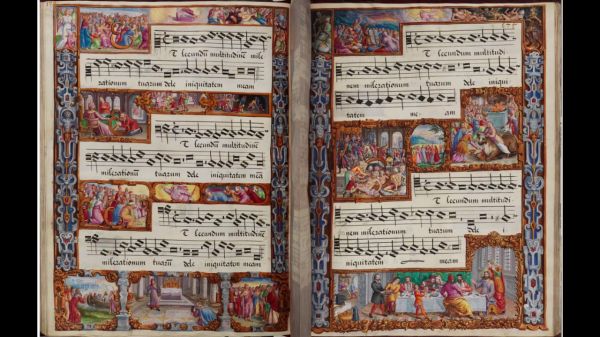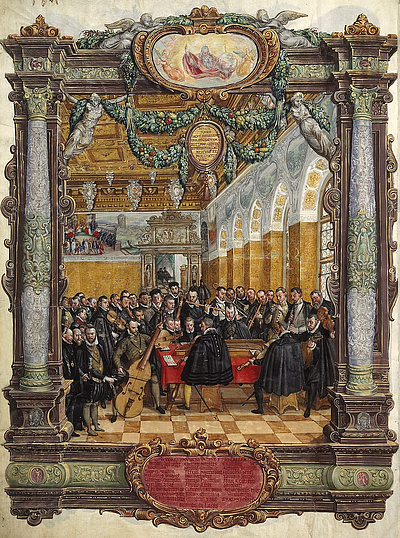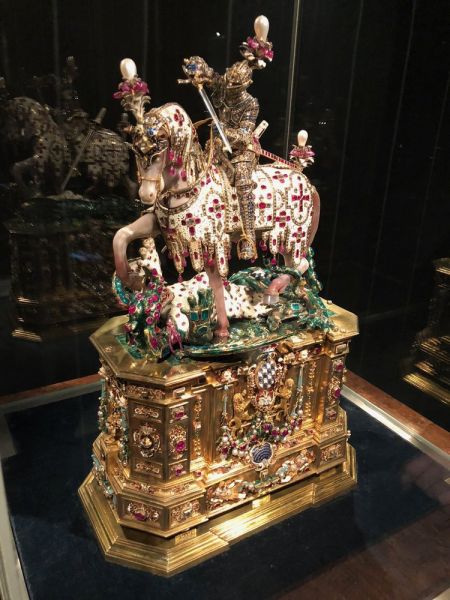Orlando di Lasso and the Music of Royalty
Seasons Greetings!
Orlando di Lasso and the Music of Royalty
The composer Orlando di Lasso was born Roland de Lassus in Mons, Belgium, in 1532. Belgium served as a kind of hatchery of musicians during that time. With their talent, they could write his own career-ticket, but mostly in other nations. The Habsburg administrators in the Low Countries decided, if young Lassus had musical gifts, he must go to Italy to learn the trade. So Lassus spent much of his youth in Mantua, studying music in the court of Ferdinand of Gonzaga, who had himself spent much of his youth in Spain serving as a page to the future Holy Roman Emperor Charles V. Interaction between royals in different empires did happen during the Renaissance, but mostly in the realm of art. As a young man, Lassus apprenticed at several churches in Italy.
His hosts italianized his name, and he kept it after he accepted a post in Munich, Germany, as the musical director for the Dukes of Bavaria. He composed a great deal during his lifetime—even after his death, so to speak, as other composers tried to capitalize on his name. Musicologists credit him with perhaps two thousand works, nearly all of them for vocal ensembles—religious and secular. Lassus imbued his compositions with cosmopolitan sophistication and emotional conviction, using the musical device of "word-painting."
I have more than forty CD recordings of music by Lassus—much of it composed for use during the church year—for seasons like Christmas and Easter, and also lesser-known seasons like Pentecost, Lent, Ascension, and Advent. My collection features choirs from France, Belgium, and Germany, revealing how much his music trascends borders. I also have recordings by choirs from Oxford and Cambridge in the UK—Christ Church College-Oxford, King's College-Cambridge,; New College-Oxford, and finally Trinity College-Cambridge.
The Choeur de Chambre de Namur in Belgium contributes a recording, led by Englishman Peter Philips, who also directs the Tallis Scholars on another recording. The Belgian Erik van Nevel leads the Currende Consort on two recordings, his uncle Paul van Nevel leads the Huelgas Ensemble on another. Cathedral choirs at Regensburg and Augsburg in Germany have made reccordings. Veterans of those cathedral choirs have become choir-directors in their own right and lead ensembles like Die Gruppe für Alte Musik in Munich, Singer Pur in Regensburg, and the Orlando di Lasso Ensemble in Hannover.
Lassus also had responsibility for composing music to receive high-profile visitors or to celebrate important occasions. For example, in 1582, Lassus had to compose music for the convening of the nobility of the Holy Roman Empire—called a "Diet," and pronounced "dee-et." It says a lot about the confidence that Lassus's employer placed in him. The music, Quid vulgo memorant, resounds in the heart with a stunning clarity. Even if the listener cannot understand Latin, the tone of the music lets him know that it concerns a reception for an extremely important personage—the Austrian Kaiser, Rudolf II, who will lead the Diet in Augsburg. My reader can hear Lassus's Quid vulgo memorant on YouTube. I prefer the recording made by the choir of Regensburg Cathedral:
Everyone is saying that the Austrian Kaiser Rudolf arrives
in Augsburg with his full entourage.
The Lord God Himself directs him to us.
The city and people of Augsburg call to him: "Enter our
city, Father Rudolf! From the pinnacle of the earth's circle,
come down to us! You, the pillar of our salvation!"
The great men of the empire come to him seeking peace
and harmony.
Great king! Live forever, Father Rudolf!
Rudolf II, Holy Roman Emperor, made me curious: so who was this great king, this "Father Rudolf"? I looked him up on Wikipedia, which says that he was not a bad guy. In later life, he kept to himself as the effects of melancholia and schizophrenia took hold in him. He never married but carried on a number of sexual relationships with both men and women, and fathered perhaps six out-of-wedlock children. He attended public events reluctantly and preferred to eat alone. This did not sit well with the Habsburg court. His advisors turned to Rudolf's brother Matthias for help, and Matthias forced Rudolf to abdicate. Modern nations have nothing on Renaissance royalty, both for over-hyping their humble realities, and for employing royal machinations to get rid of them.
But democracies also employ hype and machinations, simply because even capable human leadership has its limits. You have to fine-tune so much and control so many moving parts. America has a constitution because it works betters. A constitution gives a government its functional personality, defines its functional parameters, sense of direction, and gives it a written body of rules to guide it.
Compare that to a man as a leader who, even with natural ability and hype, has personal flaws and time limits, plus dealing with the encroachments of other ambitious men, while also defending the nation. We have the charisma and personality of a man on the one hand, an abstract of laws and administrative procedures on the other.
"The System?" a lot of people will exclaim. They hate the "System." The "System" is their enemy! We hear so often how the system takes advantage of common people. It's not true, or course. We get screwed by the men who abuse the system.
The world's nations may claim to have unique forms of government, In reality, there have to choose from two forms—rule by a man, a "monarchy," or submission to a constitution, a "republic." In the 17th century, forward-looking nations like Great Britain, the Netherlands, and a few others showed everyone else how to do a republic. The Founders of our nation took note and decided that the new United States needed a constitutional republic as well, and how right they were!
Duke Albrecht of Bavaria, Orlando di Lasso's employer, also led an unusual life. He and his wife, the Duchess Anna of Austria, led extremely religious lives, deeply devoted to the Virgin Mary. As a result, Lassus composed many settings glorifying the Queen of Heaven—five settings of Ave Regina coelorum, seven settings of Regina coeli, six of Salve Regina, and gave special weight to the "Song of Mary," known as Magnificat, 104 settings of it. Historians of the period believe that Albrecht requested daily Evensong services at the court chapel.
But Albrecht's religious devotion was his downfall. He requested Lassus to compose settings of the seven Penitential Psalms. Lassus finished them in 1557, and they have been a favorite of choristers ever since. Perhaps a dozen choral groups have made recordings of them. I have two recordings of the Psalms, myself: one by the Hilliard Ensemble (1985) and the other by the Tölzer Knabenchor of Germany (2003).
Albrecht expressed his own love of the Penitential Psalms by commissioning a special publication of them. The two volumes have tooled-leather covers, bound and decorated with gilded-silver, that contain hundreds of "illuminated" pages of high-grade vellum, "Illumination" refers to a process of painting brightly-colored miniatures on the pages. The example below should let the reader know how elaborate and labor-intensive the work is:
An introductory page shows Lassus with the musicians of the Bavarian court. Lassus himself stands at the far left.
Albrecht spared no expense in publishing these volumes. Since he employed painters, a silversmith, scribes, and a bookbinder, the Penitential Psalms must have cost him a small fortune; but he forbade his servants to show the Psalms to anyone outside the court household. Likewise, he did not allow Lassus to perform or publish the Penitential Psalms anywhere else.
Albrecht also had his craftsmen build a "reliquary," a case to store his costly, religious objets d'art—in German, a Schrein, like "shrine" in English. The reliquary stands 24 inches high and is 32 inches wide. It consists of etched panels of crystal framed in ebony and decorated in semi-precious stones. Each of the crystal columns stands on a base made of Lapis Lazuli.
A gold figurine of St. George killing the dragon also belongs in this collection. The figurine stands 20 inches. Numerous rubies and emeralds decorate St. George and the dragon.
Not surprisingly, when Albrecht died in 1579, he owed at least a million dollars. He spent all of the tax money that his subjects had paid him, the rent from his numerous properties, and all the money he had borrowed from his bankers. There's nothing new about that. If you think about it. People like to spend money, whether it is their own or someone elses. Since the leader does not particularly like having to pay it back or even thinking about it, his accountants have to wait until he dies to settle his debts. In a worst-case scenario, a leader may simply cancel his debts arbitrarily. Such is the politics of leadership above the law. Americans need to accept that the principle applies to them as well as any other nation. Only a constitution can limit a leader's ability to spend taxpayers' money.
In 1803, the Bavarian government secularized church properties. The government also confiscated reliquaries and other worldly assets of the church. Only intervention from art-experts protected the reliquary of Duke Albrecht. His publication of Lassus's Penitential Psalms disappeared for hundreds of years and only emerged again when a collector found them in an antiquarian bookshop. He paid the equivalent of $138 for the priceless volumes, then donated them to the Bavarian State Library in Munich, where they reside today.





